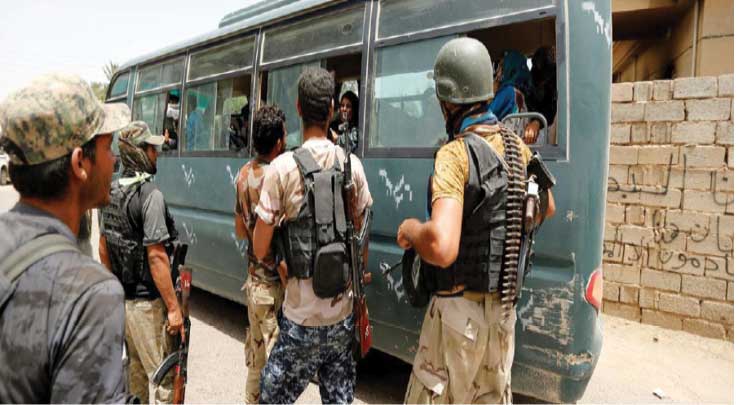
In 2016, we submitted to the UN Mechanisms 115 communications regarding 58 individuals.

IRAQ
 Our Concerns
Our Concerns
- Widespread and systematic practice of enforced disappearances by State agents and militias affiliated with the Popular Mobilisation Units;
- Systematic use of torture and the use of forced confessions in unfair trials before the Central Criminal Court of Iraq;
- Imposition of the death sentence succeeded by executions;
- Use of the Anti-Terrorism Law to justify repression of all forms.
 Recommendations
Recommendations
- Take all necessary measures to ensure that no one is secretly detained and establish the fate and whereabouts of all disappeared persons by effectively cooperating with the appropriate UN human rights mechanisms;
- Investigate allegations of torture and ensure that forced confessions are not admitted as evidence during trial;
- Abolish the death penalty or adopt a moratorium with a view to its complete abolition;
- Amend the Anti-Terrorism Law to bring it in conformity with international human rights law.
 Upcoming
Upcoming
- 14 August 2017: Two-year delay in the submission of Iraq’s follow-up report to the Committee against Torture;
- 18 September 2017: Two-year delay in the submission of Iraq’s follow-up report to the Committee on Enforced Disappearance;
- 4 November 2017: Two-year delay in the submission of Iraq’s follow-up report to the Human Rights Committee.
2016 was marked by the continued escalation of violence in Iraq, leading to serious human rights violations. The violence suffered by civilians, who are the primary victims of the conflict, remains staggering. According to UN figures, this year alone, the conflict has claimed over 6,500 lives, while in the context of a continuing humanitarian crisis, the total number of displaced persons has reached 3.4 million.
In January 2016, the Iraqi army besieged the city of Fallujah, which was captured by the Islamic State (IS) in 2014. In February, the army recaptured the towns of Al Karmah and Ramadi and on 3 May and after a prolonged siege, launched the “battle of Fallujah”. The city was re-taken a month later. On 20 October 2016, Iraqi and Kurdish troops, supported by the US-led coalition, began a massive operation to retake Iraq’s second largest city of Mosul from IS militants.
The persistent climate of insecurity is clearly illustrated by the two deadly bombings in Baghdad on 3 July 2016, for which IS claimed responsibility. With a death toll of 250, the Iraqi government considered these attacks to be the deadliest in the country since the 2003 US-led invasion. The following day, the Prime Minister and the Ministry of Justice publicly called for the execution of convicts on death row, affirming that this would “deliver just punishment to those whose hands are stained with the blood of Iraqis”. Five executions were carried out that same day, without any specification being made as to the crimes for which the detainees were sentenced.
On 26 November, the Parliament passed a bill recognising the Popular Mobilisation Units (PMU) – an umbrella organisation of approximately 40 militias that had already been placed under the control of the Ministry of Interior – as a government entity operating alongside the military. Composed mostly of Shia militia fighters, critics have said that this move would only widen sectarian divides in society.
On a political level, 2016 was marked by struggles over the country’s sectarian quota system and reshuffling of the government, after the Prime Minister announced, in February, that he wanted to appoint technocrats and recompose the cabinet formed in 2014, which is based on the Parliament’s political blocs. However, he faced significant opposition from political forces, as Parliamentarians staged a sit-in and boycotted the sessions to show their disagreement with the lists presented by the Prime Minister. Alongside this, several protests called by Shia cleric Muqtada Al Sadr were held in the capital throughout the year. In April, he issued a statement calling for the resignation of all ministers, following which protestors gathered in the capital to demand a new government and denounced sectarianism and corruption.

The fight against terrorism: an open door to abuse
The Iraqi government’s response to the deteriorating security situation and the intensification of fighting against IS fostered an environment that has brought about an increasing number of severe human rights violations, many of which are perpetrated in the name of the fight against terrorism. As a result, numerous individuals suspected of being “terrorists”, without any reasonable grounds, were subjected to summary executions, enforced disappearances, torture, and trials disregarding their most fundamental rights.
During the battle of Fallujah in May 2016, Alkarama received several testimonies according to which Sunni civilians fleeing the besieged city were shot dead, while hundreds of local residents were said to be detained and severely tortured by Iraqi military forces and state-sponsored militias belonging to the PMU in order to “determine their involvement with IS”.
Individuals displaced from areas under IS control were also arrested and disappeared on suspicion of being “supporters” of a terrorist organisation. In September, Alkarama documented the case of three men displaced from their hometowns of Mosul and Ramadi – cities then under IS control – who disappeared between May and June 2015 after having been arrested at checkpoints controlled by a State-supported Hezbollah brigade.
Moreover, trials of individual suspected of terrorist crimes systematically fail to respect due process guarantees, while lawyers defending individuals accused of terrorist crimes continue to be victims of harassment by the authorities. In Iraq, the Anti-Terrorism Law provides for the death penalty, which leads to capital punishment being routinely handed down after expeditious trials by the Central Criminal Court of Iraq (CCCI) – a court lacking any guarantee of independence – based on confessions extracted under torture or information provided by “secret informants”. As the third most frequent user of the capital punishment worldwide, the Iraqi government has repeatedly affirmed that the death sentence would serve as a “deterrent to acts of terrorism”.
Such practices are illustrated by the case of Salih Al Dulaimi, an engineering professor at Anbar University, who the CCCI sentenced to death for terrorist acts on 12 May 2016, solely on the basis of information allegedly provided by the US intelligence and statements he made under torture. The judge refused to take into account Mr Al Dulaimi’s testimony of torture and affirmed that his wounds were “self-inflicted”.

The systematic practice of enforced disappearance
As the country most affected by enforced disappearances worldwide, Iraq counts up to one million missing persons. Starting in the time of Saddam Hussein, during which approximately 250,000 people were disappeared, this phenomenon increased during the US-led invasion in 2003 and is today a widespread and systematic practice, with security forces and affiliated militias operating with complete impunity.
This year, Alkarama has documented numerous cases of enforced disappearances and transmitted these to the UN human rights mechanisms together with Al Wissam Humanitarian Assembly. It has identified the following pattern: victims of enforced disappearance are commonly arrested by the security force during house raids; individuals are then held in secret places of detention and denied access to the outside world, while their relatives are left without any information as to their fate and whereabouts. While secretly detained, they are tortured extensively, often with the aim of extracting confessions. This was the case of Mohamad Al Jabouri, who reappeared in prison in September 2016, after having been disappeared for more than one year, during which he was secretly sentenced to death by the CCCI for “terrorist crimes” on the basis of confessions extracted under torture.
Abductions of this kind are also perpetrated by pro-government militias operating alongside the security forces, especially those affiliated to the Popular Mobilisation Units in the fight against IS. For instance, Dawood Al Issawi, a 67-year-old farmer, disappeared after his arrest on 8 June 2014 by Federal Police and Imam Sadiq regiment – the armed wing of Badr political party and member of the PMU – in Salah Al Din province. To date, his fate and whereabouts remain unknown, despite the actions taken by the UN Committee on Enforced Disappearances (CED) in September 2016, after it was seized by Alkarama and Al Wissam Humanitarian Assembly.
In addition, the fate of hundreds of those who disappeared during the US-led occupation still remains unknown. This year, Alkarama continued to raise cases of disappearances carried out by US forces with the UN. This included, for example, the case of Mazen Al Izzi, who was arrested by the US army on his way to work on 10 January 2004. Four years later, a former detainee informed his relatives that he was held in the Fifth Division of the Army in Kadhimiyah, northern Baghdad. When they asked about him, the authorities denied any involvement in his detention. More than 10 years have passed, yet despite their best efforts, to date, his family remains without any information as to his fate and whereabouts.

CRACKDOWN ON HUMAN RIGHTS ACTIVISTS
This year again, human rights defenders, especially those documenting violations, experienced harassment and attacks in retaliation for their work from the Iraqi security forces and affiliated militias.
Victims of this repression include members of the human rights NGO Al Wissam Humanitarian Assembly, which has documented numerous cases of enforced disappearance and submitted them, together with Alkarama, to the relevant UN human rights mechanisms.
On 6 March 2016, two members of the NGO, Imad Amara and Faisal Al Tamimi, were arrested in Baghdad, handcuffed, blindfolded, and taken to an unknown location where they were severely beaten, insulted, and threatened while being interrogated about their work with families of disappeared persons for about two hours. They were released in Baghdad later that night. A few months before, the NGO’s founder, Salam Al Hashimi, was also subjected to reprisals: he was threatened by members of the security forces and an arrest warrant was issued against him in December 2015, accusing him of terrorism. Alkarama raised their cases with the UN Secretary General, who, in his annual report in September 2016, strongly condemned the retaliatory measures against the three men.
This year, Alkarama and the Iraqi Observatory for Human Rights also raised the case of lawyer and human rights defender Waee Al Jabouri with the CED. On 19 August 2015, he was arrested at a checkpoint by the Liwa Al Sadr militia, an armed group part of the PMU, and has not been seen since. His closest collaborators, friends and family, believe he was arrested and disappeared as a retaliation for his activism, as only a couple of days before his arrest he had met with several other activists to organise a peaceful demonstration.